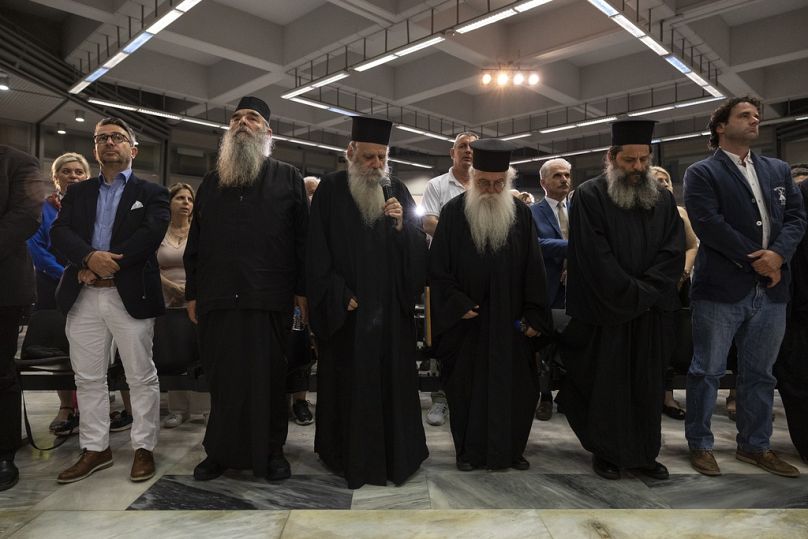An obscure extremist party's surprising result represents uncharted territory for Greece as it grapples with the resurgence of extreme right-wing ideologies just three years after the conviction of Golden Dawn, Georgios Samaras writes.
On 15 June, just two weeks before the second round of the Greek general election, a cryptic photograph posted on Twitter by Ilias Kasidiaris, the imprisoned neo-Nazi politician and former member of parliament for Golden Dawn, sent shockwaves through the political landscape.
 ADVERTISEMENT
ADVERTISEMENT
 ADVERTISEMENT
ADVERTISEMENT
Kasidiaris urged his supporters to rally behind a mysterious political entity known as Spartiátes, or Spartans.
Fast forward two weeks, and the unimaginable had happened. Spartans, an obscure political party that had previously flown under the radar, managed to secure a notable 4.64% of the total vote share, earning twelve seats in the 300-seat-strong Greek Parliament.
How did this happen, and who exactly are Spartans?
Racism, Holocaust denial and prison endorsements
The roots of the party can be traced back to 2017 when its leader, Vasilis Stigkas, made a noteworthy appearance on a far-right YouTube channel hosted by neo-Nazi author Konstantinos Plevris.
Eager to expand their influence and solidify their presence, Spartans made a bid in the 2019 European Parliament election. However, their alliance with the Énosi Kentróon, or Union of Centrists party failed to yield the desired outcome.
The party's close association with Ilias Kasidiaris, who sought to establish the far-right extremist political entity Hellenes ("Greeks") upon his departure from Golden Dawn, cannot be ignored.
Despite serving a prison sentence for his involvement in a criminal organisation alongside Golden Dawn, Kasidiaris assumed sole leadership within Hellenes.
The party quickly gained traction through its active presence on various social media platforms, attracting attention and amassing a following among far-right circles.
Kasidiaris took advantage of his access to social media platforms, utilising them to unleash his distinctive podcast and regularly disseminate provocative statements via Twitter and YouTube.
His content focused on his self-proclaimed status as a political prisoner, vehemently criticising the government's lockdown policies and spreading anti-vaccination propaganda.
Hellenes also dabbled in overt racism, Islamophobia, and Holocaust denial — talking points all shared with Golden Dawn.
Hellenes ban brings on Spartans
The government attempted to curb the influence of convicted politicians associated with Golden Dawn by passing a law in 2021 barring them from assuming leadership positions in political parties.
However, Kasidiaris boldly revealed his intention in early 2023 to run for a parliamentary seat, prompting the government to enact emergency legislation that banned him from participating in the upcoming election.
Undeterred, Kasidiaris patiently waited until mid-June, strategically timing the completion of the party registration process ahead of the Greek General Election in June 2023.
With calculated precision, he unveiled his endorsement of Spartans on Twitter.
This move had been carefully orchestrated over several weeks, with the ultimate goal of aligning himself with an unknown political party that would act as Kasidiaris' Trojan horse.
Most importantly, several candidates of Spartans who secured seats in the Greek Parliament have ties to the Hellenes, while others are closely associated with the neo-fascist Golden Dawn.
Leading from the shadows of a prison cell
It is no coincidence that, on the eve of the election, Vasilis Stigkas, the leader of Spartans, expressed gratitude to the convicted neo-Nazi politician Kasidiaris, heralding a transformative era in Greek politics.
With Kasidiaris' unwavering support, Spartans became his indirect representation within the Greek Parliament.
Without his backing, the far-right party would have struggled to gain such a significant share of the votes in a Greek electoral contest.
Spartans now find themselves joined by two additional far-right parties that have secured seats in the Greek Parliament: the ultraorthodox Niki (which stands for Democratic Patriotic Movement – Victory) and the pro-Russian Greek Solution.
Together, this far-right bloc has garnered a shocking 34 seats out of the 300 available, commanding a formidable presence with 12.77% of the total vote.
No left to speak of
The rise of the far-right in the country can be attributed to the ongoing normalisation of extreme practices in Greek politics, in particular by the ruling New Democracy and PM Kyriakos Mitsotakis.
The government's involvement in pushbacks against refugees and the accusations of wiretapping political opponents and journalists have played a crucial role in the gradual conservative shift within Greek society.
The composition of the parliament is unsettling and suggests uncharted territory for Greece as it grapples with the resurgence of extreme right-wing ideologies just three years after the conviction of Golden Dawn.
The declining influence of the former party in parliament seems to have been supplanted by Spartans within this newly formed far-right bloc.
Greece now faces a critical question: Is the country prepared to combat far-right extremism for the second time in a decade?
Compounding the challenge is the weakened state of the left and the prevailing dominance of conservatism in Greek politics.
As the fight against the remnants of Golden Dawn intensifies, Greece must confront a more formidable challenge than ever before.
Georgios Samaras is an Assistant Professor of Political Economy at the Department of Political Economy, King’s College London.
At Euronews, we believe all views matter. Contact us at view@euronews.com to send pitches or submissions and be part of the conversation.














